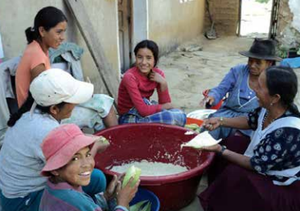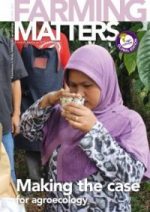In Bolivia, an assessment of short supply chains, facilitated and certified through Participatory Guarantee Systems, helps to show how agroecology impacts both consumers and producers. Happiness is an important dimension to this story.

Achocalla is a highland valley situated a few kilometres away from La Paz, Bolivia. There, small scale farmers produce about 20 % of the vegetables consumed by almost two million people in the cities of La Paz and El Alto. In the spring of 2010, Achocalla’s Señor de Mayo Square became the backdrop of the first small producers’ fair, which kick-started a nation-wide cycle of agroecological fairs aimed at fostering exchange between peasants, small producers, and consumers and to promote the consumption of agroecological foods.
Short chains
Bolivia’s political transition of 2006 led to a favourable regulatory and legal framework for promotion and support of agroecological production. This includes a number of laws promoting food sovereignty and a national technical standard for Participatory Guarantee Systems (PGSs). One result has been the development of short chains, with agroecological standards guaranteed through participatory processes. There are municipal PGS, of which the bio-fair in Achocalla is an example. There are also communal PGS, promoting economic solidarity amongst indigenous groups; private PGS suitable for small producer organisations; and organisational PGS suitable for larger producer organisations.

The municipality of Achocalla set up their PGS in 2012, involving 275 families grouped into 13 communities. The agroecological guarantee committee of Achocalla Municipality (CGEMA) is responsible for running the PGS, and is made up of producers, processors, service providers and consumers. The PGS has created direct relationships between producers and consumers, with benefits for both. For the farmers, the PGS has improved their chances of accessing differentiated local markets and raised their profile as agroecological producers. Meanwhile, citizens are no longer reduced to passive consumers.But in spite of these achievements, the effectiveness of agroecological practices remains difficult to prove as indicators differ according to local circumstances and to who makes the assessment. This inconsistency compounds neglect from policy makers the world over, who often regard the idea of meeting future food and nutrition demands through agroecology as nonsense.
Proving impact
Another food system
During Bolivia’s neoliberal period (1985-2005), agricultural production was oriented to providing cash crops for the oil industry and white sugar for export to neighbouring countries. After the political transition of 2006, a new approach based on the BuenVivir (good living) philosophy resulted in a new legal framework based on the principle that to reduce global poverty, it is not enough to simply produce more food but that food should be of high quality, safe for human health, biodiversity friendly, and accessible and available to all.
Bolivia’s political transition not only yielded Law No 3525 for the Promotion of Ecological Agricultural Production and Non-timber Forestry, but also the Food Revolution law, the law for the Promotion of Healthy Food Habits, and recently enacted law on Economic Organisations of Indigenous and Peasant Peoples of Bolivia (OECAs), which addresses fundamental issues such as the importance of family farming, collaboration, food sovereignty and the prioritisation of locally sourced foods. Since the political transition, some 7000 producers have received training in agroecology of which 650 producers are now classed as agroecological farmers and 2700 producers classed as in transition, totalling around 3400 agroecological farmers in the highland, valley and tropical ecoregions.
In 2012, the NGO AVSFBolivia started a project named Mercados Campesinos (peasant markets) to assess the development and functioning of these new markets and to inform policy makers at the National Ecologic Production Council. They assessed three municipal PGS, Achocalla, Batallas (La Paz) and Caracollo (Oruro), and one private PGS, Eco-Feria in Cochabamba.
The assessment approach was based on four dimensions of food security – availability, access, utilisation and stability – and happiness. The happiness dimension, referring to the level of satisfaction of all actors in the chain was the most novel dimension of the assessment. Producers, processers and consumers were all surveyed and asked to score indicators relating to each dimension of food security.
Producers and consumers were asked different questions, reflecting their different roles in the PGS. For instance, for the happiness dimension producers were asked to rate, on a scale from one to five, how happy they are with their production, transformation and commercialisation tasks. While for this same dimension consumers were asked to rate their degree of satisfaction with the agroecological produce. Similarly, for the access dimension producers were asked about their household food expenditure budget and to rate the ratio between own production and expenditure and consumers were asked about their frequency of visits to agroecological fairs.
Happy municipalities
The assessment enabled comparison between the four PGS and helped to explain reasons for different impact. Farmers, consumers and other actors in the Achocalla PGS expressed the most satisfaction. Sergio Quispe, the Vice President of CGEMA explains: “Achocalla is the star agroecologic municipality because all actors in the value chain work together and are supported by the municipal agroecology and social development platform.” The project showed how the short chain impacts farmers and consumers in a number of ways.
“I am very happy because I can feed my sons and sell our surplus production”
For example, Jose Copa, a farmer and handyman in Achocalla enjoys the reduced transportation and transaction costs: “I am very happy because I can feed my sons and sell our surplus production twice a month at the bio-fair.” And Jaime A. Pereira, a regular visitor to the bio-fair exclaims that, “I can find healthy vegetables, honey and cheese that look better, are fresher and cheaper than in supermarkets.” Farmers’ access to valleys and highlands in Achocalla enables diversified production and this also explains their satisfaction with their role as producers.
In general, the three municipality PGS had more positive impacts than the private PGS and this is largely explained by current policy which favours municipal PGS. The actors in municipal PGS have better access to financial support and other initiatives such as public procurement programmes. Moreover, many of the members of Eco-Feria, the private PGS, specialise in value-adding such as preparation of jams, encurtidos (pickles) and vegan foods and are not diversified producers as is the case in the other municipal PGS assessed.
The Mercados Campesinos project was able to prove the importance of short chains for both producers and consumers. The results are useful because they capture a whole agroecological chain, from farm to market, and take into account happiness as well as different dimensions of food security. The project provides insights for further public policies that support family farming and stronger relationships between peasants and consumers.
Eduardo Lopez Rosse (elopez@catie.ac.cr) is a researcher on environmental and social certification schemes. He works at the Department for Consumers’ Affairs of the Autonomous Municipality of Cochabamba, Bolivia (GAMC).

